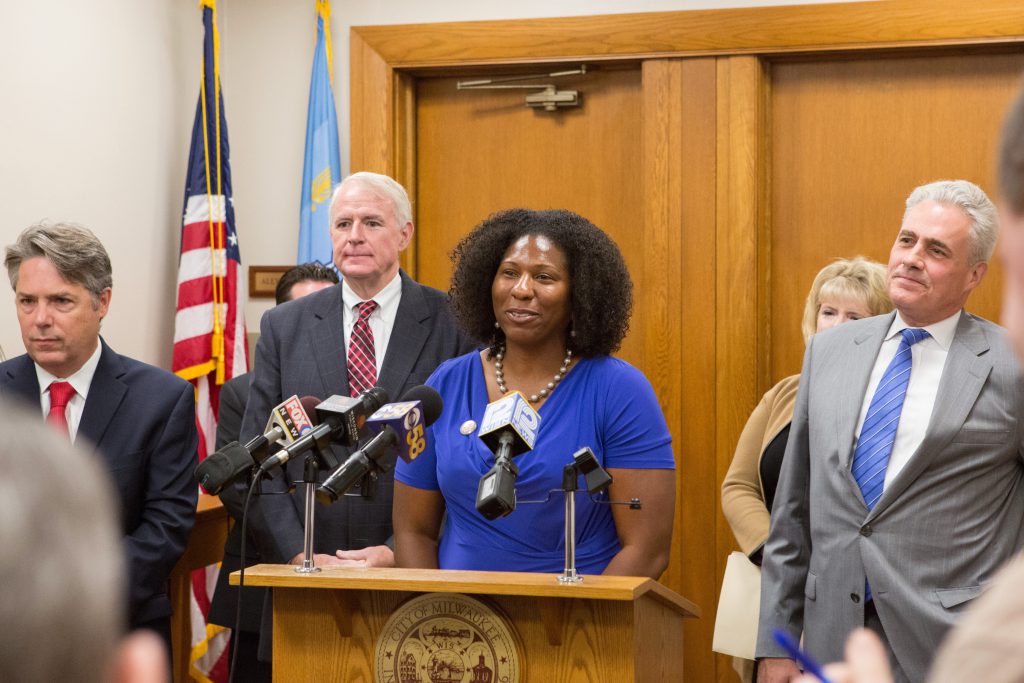City Needs Less Charity, More Justice
Common Ground leader Keisha Krumm reflects on her years in Milwaukee.

Keisha Krumm speaks at a news conference at City Hall in 2015 at which Nationstar Mortgage announced it would contribute $30.5 million to help Sherman Park homeowners recover from the foreclosure crisis. Photo courtesy of Common Ground.
Milwaukee is a city that does not strengthen the hand of the poor. It seems, instead, to be satisfied with kind gestures of charity toward the symptoms of unfairness. Pope Pius XI said, “Charity will never be true charity unless it takes justice into account…. Let no one attempt with small gifts of charity to exempt themselves from the great duties imposed by justice.”
My over eight years in Milwaukee as Common Ground’s Executive Director and Lead Organizer has been dedicated to building justice with and for those left behind in this city. Common Ground has created controversy and tension, including pushing big banks and billionaires to recalculate their civic interest in broader terms. I am proud that we have had the moral courage to demand more than just charity for neighborhoods, education, health care, and housing.
Corporate Milwaukee thrives within that culture. While its leaders express frustration and irritation with the patterns and habits of Milwaukee and Wisconsin political decision-makers, they still get to dream big and make their ambitious visions come true. We see their success in Milwaukee’s booming downtown development, Fiserv Forum, Northwestern Mutual headquarters, expanded Milwaukee Art Museum and the Potawatomi Casino — just to name a few.
Yet corporate Milwaukee’s appetite for real justice is invisible and its lean toward charity well defined. We see this playing out in small and nice initiatives in neighborhoods, where corporations and the powerful sponsor concerts in the parks, murals, movie nights, and other fun events giving the appearance of civic caring and engagement. I have enjoyed participating in these events with my family and friends, but it’s not enough. The one-dimensional focus on charity does nothing to address the core injustices present in the political structures that have created the divided city we have.
Milwaukee’s corporate preference for charity over justice creates a situation that erodes the ability of our poorer residents to think big, act boldly, and see their hopes and dreams materialize in tangible results that change their circumstances of jobs, education, housing and neighborhoods. Not-for-profit organizations know that if they want to get funding they are expected to ask for small, feel-good programs that skate across the ice of justice but never challenge the establishment for more than it is willing to give.
Milwaukee’s corporate community has an opportunity to do more to create innovative strategies that address the challenges of unemployment in the urban core, increase investment in our public education system, and improve the quality of life in all neighborhoods. Rockwell Automotive has moved in this direction with its partnership with Manpower to recruit, train, and place veterans in living wage jobs. We need more of this kind of thinking on the workforce landscape in Milwaukee.
As I leave this city to take on a new organizing challenge in Cleveland, I know the inclination for charity over justice is not particular to Milwaukee. It is a disease that plagues the Great Lakes region and beyond.
I am proud that Common Ground understands the reality of Milwaukee’s preference for charity over justice. We have built a tough and strong organization that nudges this great city toward big, bold initiatives involving the people who usually get left behind. We are committed to the common good of Milwaukee and making it a city where all can thrive, not just survive.
Keisha Krumm has been organizing over 17 years with the IAF, including 8.5 years as the Lead Organizer for Common Ground, in Milwaukee, Wisconsin. She can be reached kmkrumm@gmail.com
Op-Ed
-
Unlocking Milwaukee’s Potential Through Smart Zoning Reform
 Jul 5th, 2024 by Ariam Kesete
Jul 5th, 2024 by Ariam Kesete
-
We Energies’ Natural Gas Plans Are A Mistake
 Jun 28th, 2024 by John Imes
Jun 28th, 2024 by John Imes
-
Milwaukee Needs New Kind of School Board
 Jun 26th, 2024 by Jordan Morales
Jun 26th, 2024 by Jordan Morales






















This is a message of truth and insight. It is also a call to action for all those who brand themselves as civic leaders, activists.and involved residents.
Thank you for your work, Keisha, and good fortune in Cleveland.
May Saul Alinsky’s message and methods continue to grow.